Podcast - Adam Savage Project
Hearing Loss – 3/11/2014
On a very special episode of Still Untitled, Adam, Will, and Norm discuss hearing loss, Adam’s recent ear surgery, and why you should probably get your hearing checked. Enjoy!
Whalerock
On a very special episode of Still Untitled, Adam, Will, and Norm discuss hearing loss, Adam’s recent ear surgery, and why you should probably get your hearing checked. Enjoy!
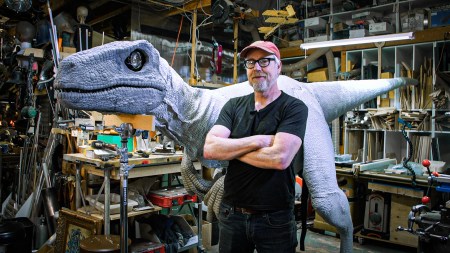
One Day Builds
Adam embarks on one of his most ambitious builds yet: fulfil…

Show And Tell
Adam recently completed a build of the royal St. Edwards cro…
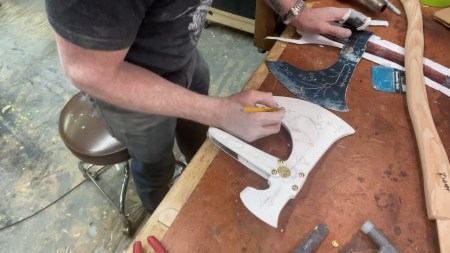
Making
Viewers often ask to see Adam working in real-time, so this …
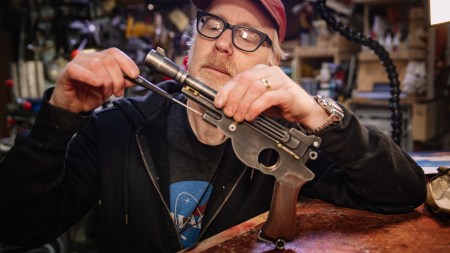
One Day Builds
Adam and Norm assemble a beautifully machined replica prop k…
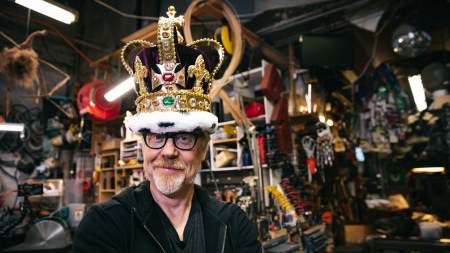
One Day Builds
One of the ways Adam has been getting through lockdown has b…
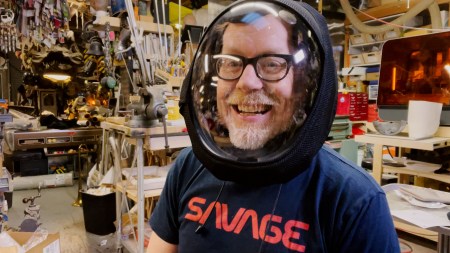
Making
Adam unboxes and performs a quick test of this novel new hel…
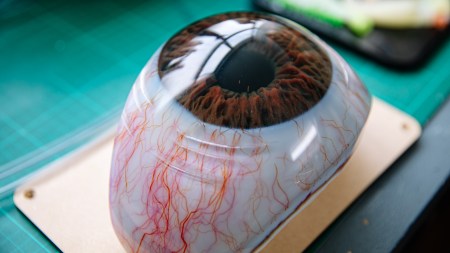
Making
When Adam visited Weta Workshop early last year, he stopped …
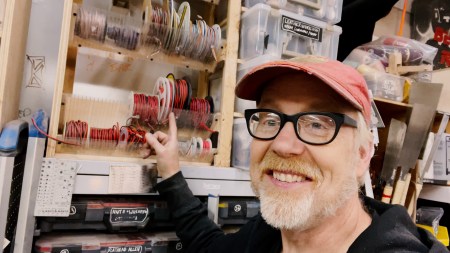
One Day Builds
Adam tackles a shop shelf build that he's been putting off f…
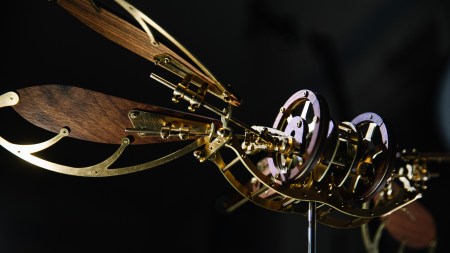
Show And Tell
Time for a model kit build! This steampunk-inspired mechanic…
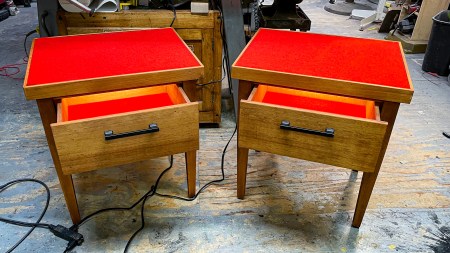
One Day Builds
Adam reveals his surprise Christmas present for his wife--a …
That was some really great information. Thx a lot! 😀
Adam – I have had a substantial hearing loss beginning when I was a teenager (tuning drag racing engines with a mechanic’s stethoscope). It was enough to keep me out of the army in 1981 when I tried to join up – I wanted to learn to fly helicopters and my damaged hearing killed my dream. I’m 51 now and for over 30 years I have always refused to pursue hearing aids because of the stigma that I associated with them. I know that my wife and kids are driven crazy by my seeming aloofness. As you said, you make no secret about your hearing problems and the fact that you wear hearing aids. I am a tremendous admirer of you and your openness and frankness about your situation, more than anything else, has really helped me realize that I do need to go and get things corrected. Thank you for helping me see (pun intended!) that hearing aids aren’t a bad thing but they are the gateway to super powers! 🙂
Oh man. I grew up with medical stuff at home and I’m still squeamish. Norm, I’m right there with you on the “Nope!” feeling. I cringed.
I saw this a few days ago. Your wish has been granted.
http://www.macrumors.com/2014/02/24/first-made-for-iphone-hearing-aid/
wow, thank you for doing this podcast as I do have hearing loss due to bad sinuses and a number of ear infections over the years. actually I have to take a decongestant on a daily basis just so I don’t a. get ear infections due to a lack of drainage from my sinuses and b. to keep from getting such a major headache from that pressure build up. I think that next time I am at the doctor I will see about getting my hearing checked. thank you… also I would like to comment on the “stigma” I personally couldn’t think of a stigma other than of having the chore of up keep and things like that. although the idea of actually being able to mess or change the settings on the fly to a hearing aid is probably an idea that is awesome. why couldn’t one do that as once you buy those hearing aids you own them and so have the right to modify them as you see fit (although all warranties are voided). but why couldn’t one develop their own hearing aid? I mean its just a matter of what one is comfortable with as far as size and attachment. I mean if adam wears a necklace with that he can attach a mic to someone he wants to hear than anything really is possible if one is comfortable with the apparatus. love the show keep up the great work and information you all share!
My grandmother has severe hearing loss and my mom is also loosing her hearing. My grandfather invested a lot in hearing aids, and my grandmother has always hated them because they amplified everything and gave her headaches. You can’t imagine how hard it is to find a place to eat out where everyone can hear each other. could you please comment on how the bluetooth mic that you place on the other person works on a restaurant setting, we are thinking on investing on a hearing aids set with that function and your input would be greatly appreciated.
My grandfather used to say: Society isolates the blind and the deaf isolate themselves.
I was recently hearing tested and I have profound hearing loss in my left ear. I’ve known this for awhile, so I’ve always tried to social engineer myself in public so that anyone I want speak with is either in front of me, or on my right.
After being tested I was given a brochure for hearing aids. It has been over a year and I still haven’t gotten one because they are so expensive that I cannot afford one. I hope this changes at some point, but for now, my wife sadly asks me which side she should be standing on before she asks me a question.
BTW, I am 34 and I’ve known about my hearing loss to some degree for about 10 years. Good episode, even though at times it made me squirm.
Excellent podcast, Guys! 🙂
Another interesting episode. Thanks guys!
theres this danish company that provide control of their hearing aids via iphone…
http://www.resound.com/
Good episode, guys. I have hearing loss in both of my ears from normal wear and tear and working in a machine shop for the better part of ten years and it’s that tinny, high pitched stuff that makes it impossible for certain situations. Doctors said that it could be fixed by surgery but until now I didn’t know that they could possibly do it in-ear. I’ll have to look into that a bit more.
Too short 😀
I’ve had tinnitus all my life (I’m 29). I wish there was a cure for it. Since it’s been a part of my life for so long, I know how to tune it out, and when I’m going about my day to day business, it’s a non-factor. At night though sometimes I wish I could experience silence without the high pitched tone in my head.
Wow. OK, I always enjoy Still Untitled, but I think this is the first time it’s ever had a really direct personal connection to my own day-to-day. (Well, apart from the time Adam talked about his horror of table saws. Right there with him on that, those things are scarier than a car crash.) I have the opposite problem with my eustachian tubes – they won’t open without a fight, particularly the left one – so air travel is an exercise in physical misery and I don’t even want to think about what would happen if I tried scuba diving. (Strangely, that problem seems to be entirely independent from my chronic tinnitus, which I’ve been told is neurological – it’s happening somewhere in the auditory center of my brain, I’d still be hearing it even if I didn’t HAVE ears. Words struggle to encompass how annoying this is.)
Meanwhile, my grandfather is deaf as a post from his time on the Army Reserve rifle team back in the days when ear protectors were for wimps. Because it was a line-of-duty injury of a sort, he can get hearing aids through the VA – the problem being that they’re typical government lowest-bidder junk, the kind that make screechy feedback noises clearly audible to everyone else in the room if anything comes near them. As a result, he quite understandably detests them and only puts them in when absolutely necessary. He’s always tried to find the comedy in the situation, but in the last few years his hearing’s been getting much worse and I can tell it’s starting to get him down a bit. A few of us in the family have been encouraging him to look in civvie street for better alternatives, and here is direct confirmation that the state of the art really is a lot better than he’s getting now.
Microphones, speakers, batteries, and circuitry all being small is challenging. As a computer scientist I offer my opinion that the challenge to making these devices hackable is in the signal processing circuitry. Without question the ability to reproduce sound accurately is a solved problem thanks to portable electronics and economies of scale, but getting that technology in a small ear-sized package may be a challenge. Maybe the best approach is to do the processing in a separate unit so that larger(cheaper) processors could be used. Keep the speakers and microphones at the ears where they should be. Getting all the options dialed in with a large, phone-sized device and then making a small custom circuit for the ears might be a good path.
I agree, I’m very interested in that as well. Putting a mic on the other person in a crowded-room conversation is genius – one of those why-didn’t-I-ever-think-of-that ideas.
that was interesting. i think i can do the same eustachian tubes thing that adam mentioned – it feels a bit like doing an internal stretching action to the upwards rear of your jaw joint, resulting in the ears popping, right? maybe i should ask for a screening with my next check up at the doctor’s.
not much else indicates hearing loss for me, though. whenever i switch on the stereo or tv that someone else used before me, i usually dial the volume back down. i go “what?” all the time, but that’s from being really really absent-minded.
Just wanted to say thanks to for the openness and candidness. While I don’t suffer from hearing loss, it’s wonderful to have someone be so open about whatever challenges they may have. Bravo sir.
First, i don’t believe you are not allowed to choose your settings. i know my uncle can control his hearing aids with his phone and has like different setting for the car or a party of diner, that are pre-set to how he finds them best, and then just needs to recall them. his entire hearing aid is also completely in his ear so you see nothing if you don’t know. what freaks me out every time he gets a phone call and just starts talking to no one.
I also want to use this post to everyone to check your ears, and if you love going to music shows to buy good ear protection. i work as a sound engineer and due to a explosion 15 years ago i lost 6000hz for 70% on my left ear. when i do a simple hearing aid test i always get 20/20 score, but that’s because my brain fills in the gap. with a otto acoustic emission test they are able to tell you how exact your ears are and what you can do to protect them. i paid 200€ for the best(most flat level) 12db filters i could get and they allow me to here better and not have to worry at a rock concert. it’s a cheap investment for something that is almost impossible to repair when it’s gone.
Pretty much my whole family has hearing problems, with several of them having hearing aids. I likely need them, but don’t have a proper job and don’t see it as a high priority. Specially when I have at lest 2, probably 3 teeth that need to be removed due to decay.
Though I have developed probably the worst thing to do to someone with hearing aids. Mid sentence I will stop vocalizing but continue mouthing the words. Sometimes I pick back up other times I’ll just finish and stop. My sister tends to start falling for it before realizing she can still hear stuff and that I’m just messing with her.
I just found out that I need hearing aids and I’ve been fairly depressed about it. Finding out that Adam wears hearing aids really makes me feel better – I don’t know why, but it does. Adam, thank you for sharing.
Thanks for the great podcast; I really enjoyed it!
Questions for Adam: when you wear on-ear headphones like the ones during this podcast, do you keep your hearing aids on or off? Also, is battery life ever an issue for the hearing aids?
So glad you discussed your hearing loss. I noticed early on you had hearing aids and as a fellow wearer I wondered what your particular conditions were. I also had my ear cut open like a door on a hinge and the healing was awful. It took so long to adapt to sleeping off that ear. This post is also super timely as just today I received my approval letter to jump from the old analog Bone Anchored Hearing Aid to the new digital. Can’t wait.
so they just went in from a little incision from behind your hear, and not a the entire back of the ear? Does this leave you having to having to regenerate the nerves in the outer reaches of the ear lobe area?
I only ask cause I had a timpanoplasty (probably spelled wrong) about 22 years ago, and they ended up cutting pretty close to the entire back of the ear, away. Then reattaching it, leaving me with a good period of time that while the nerves regenerated it was close to unbearable. They also took the skin graft for the repair from that same general area of skin behind the ear.
I was born with significant hearing loss – it was picked up with a routine hearing test in elementary school (about age 6) after the teachers thought I was just ignoring them. I may have been ignoring them as well, but the main reason, it turned out was because I was functionally deaf.
My ENT did some extra poking around after tonsil/adenoid surgery on me, and my hearing returned. I still have a large midrange gap in my hearing (I’m 45 now), but my upper registers are better than they should be “for my age” (even accounting for “one too many” loud rock concerts in my youth. 😀 ). I get tested yearly and the docs have not recommended augmentations for me yet. Downside is that there are certain voices I just can’t hear – but also “autotune” default just gives me a headache.
This cast was just sync’ed to my phone – and I’ll listen to it tomorrow (but your podcasts are usually entertaining, so don’t take that as a criticism.) I just have to be in the right “headspace” to listen to one and wife is home and this means “couple time”. 😀
Try having some sort of passive noise going on while you sleep. I’ve left my ceiling fan on for as long as I can remember, and recently started using a sleep app on my phone with various sounds (I like the ocean waves one). Both help pretty well.
As someone who greatly respects James Randi and is hopefully a future anesthesiologist I really enjoyed that story
An asymmetric loss of hearing could be a sign of an acoustic neuroma. I Have a family member who is going through treatment for AN right now actually, so it’s on my brain. Hope its nothing but it might be worth looking into.
When I was finally hearing tested by an audiologist, the surgeon in the office ordered an MRI to rule acoustic neuroma out. I got the MRI and was cleared of AN luckily.
In the same visit, I described the event that I am almost certain caused my hearing loss. Both the audiologist and the surgeon agreed that what I described was almost certainly the culprit.
But I still went and got the MRI, which I had to pay for out of pocket, due to lousy insurance. I finally paid that off and now after fixing some house disasters, I’m saving for a hearing aid.
To me it’s just mindblowing that now these devices come with bluetooth, active noise cancelling and so many other functions. I still can remember one of the first sets my grandmother got, which where just huge and loud and the battery lasted a couple of hours. What interests me about the cordless mic is how good it filters ambient noise and amplifies the speakers voice, and if you could have more than one for a sort of conference call.
I’ve been naturally doing that (clearing/popping my ears without holding my nose or anything like that) without thinking it was at all dangerous since I was very young. I’m extremely glad I saw this. I made an appointment with an ENT five minutes after I watched this. I might be being paranoid but it’s still scary. Thanks guys!
Thank you for sharing this Adam. Fascinating.
I actually submitted that at the Tested hint address when the article came out. I’d love to see Adam try them out and make a review.
I can do the same ear popping thing at will, but I’ve always had excellent hearing* and still do. I am however interested in iPhone compatible hearing aids for my dad.
*(To the point of being a nuisance to be honest. Some noises are unbearably loud to me, like someone running their hand on a fabric. It’s like nails on a blackboard to me.)
Very interesting. I find myself saying what Sometimes. But not to the point that it complicate things. I did a hearing test on my phone a while ago and got good results so hopefully I have decent hearing.
But another thing I find a bit curious is anaesthesia. I live in Sweden and I have my fair share of dentist visits. Taken out wisdom tooth, root canal fillings, fixing cavities etc. Never once I’ve been put out. I’ve just gotten some local anaesthetic for the procedure. Seems like it’s common practice in the states to put put the patient when some work is needed.
And I totally agree about that it is creepy when someone makes an procedure to the head. One time I got an infection behind one eyeball. And when I got to an eye specialist (in dire time) they immediately put a device (kinda like a nailgun) into my nose and shot a spike through the inside of my nose into the back of the eye socket to relieve the pressure that the infection caused. This they did without any tranquiliser or anaesthesia. I just heard a crunch (bones breaking) and then I passed out. The rest is history =)
Here is yet another solution to fix the awful system they have in place right now.
As you you were saying , they don’t want people performing medically learned adjustments to the hearing aids, for fear of you doing something the wrong way and ending up hurting yourself. Your solution to give your smartphone the capability to change the settings within a prescribed bandwidth is without a doubt the most practical and best solution. However, since they won’t do that, maybe they should at least set something like this up.
1. Say you’re in the bar, and you’re having problems focusing on the sounds you intend to hear.
2. You send a text to a number that is in place for problems like this. The number that you are contacting is either a pre-programmed system that will take in your complaint and then send the proper fix straight to your Bluetooth enabled hearing aid. If the technology isn’t quite there in order to be able to sort out every problem like this, then there’s even another way.
3. You send a text to a number that is in place for problems like this. The text is received by a designated team that is trained in this kind of medical technology. This team has access to your current hearing aid settings and records. They look at your complaint, make an adjustment, and wirelessly transmit the correction to your Bluetooth enabled device, effectively fixing the solution with in an exponentially smaller frame of time.
Granted, a system like this would cost money and is less effective than the smart phone app solution. (It would also create some new jobs though…) However, the doctor and hearing aid company has an obligation to you as a patron and patient to be able to fix your problems in a reasonable time frame. As you said, two weeks is way too long, and highly ineffective. It’s pretty shitty that a better system has not been worked out for something like this. I can get 24 hour a day help with my phone (less techical than a hearing aid, but vastly unimportant in comparison to someone who can’t fucking hear!), but you can’t get a timely solution to an immediate problem.
Good talk, and .
If any hearing aid reps read this, do something guys and gals! There are awesome people out there who can’t hear properly!
‘Anesthesia is the practice of bringing people to the edge of death and holding them there while you do terrible things to them’
I want to say thanks to for pointing out that if someone doesn’t hear what you said the first time, modulate how you say it. I don’t have hearing loss (yet, but I’m still young), but I have a mild form of Auditory Processing Disorder, which is pretty much what it sounds (pun somewhat intended) like. Essentially my brain doesn’t filter sounds very well, which sometimes results in the same sort of issue with hearing garbled speech. It helps a lot when the person changes how they speak the second time. So once again thanks, and all of you guys keep being awesome.
As a hearing aid wearer about to get my third pair in the last ten years, this episode has motivated me to seek new providers; my experience has not been nearly as positive as Adam’s, I’m afraid.
Incidentally, avoid unprotected sex with the hard of hearing. You might contract hearing AIDS.
thanks for clearing that up. Seems like the movies gives a wrong image of u.s dental practices =)
It would be interesting to hear ‘s experiences with the whole process of getting hearing tests done- the reason I’m interested is because my mom has lost most of her hearing due to nerve damage (I’m the person who mentioned this on twitter, BTW) and the emotional impact of her progressive hearing loss makes it hard for her to think about having her hearing checked again. What made you decide to get your hearing checked, and were there any emotional hurdles to get over?
On another note- thank you, thank you, thank you for talking about how to speak to a person who has hearing loss! Something a hearing specialist told my mom was that when you have hearing loss, the problem is not always that sound sounds faint, but some of the time (and especially with human speech) it’s that you cannot process the sound you are hearing. (Like Adam said, you replay the phrase over and over like a recording in your head until the words sort themselves out, and sometimes they just don’t!) The specialist said when you have hearing loss you have lost a small part of the comprehension of your own language, so speech that is indistinct is as hard to understand as a phrase in a language that is foreign to you. That’s profound!
Thank you for talking about hearing loss. For 40 years I gradually went deaf, and so used every new generation of hearing aid, and was grateful for every advance in the technology. But, by the time I turned 50, the aids could no longer amplify what wasn’t there. I went through two surgeries for cochlear implants (yes, they drill through bone in your head!) and my life has been transformed. Tests show that I am now hearing at 98%! This is what supporting basic research does. Thank you to all of the scientists and doctors who have perfected it to this point. I’ve written about what it’s like to have CIs here: http://hencam.com/henblog/2013/12/a-life-transformed/
BTW, I see NO stigma to hearing loss when you are up front about it and get aids. People think that my devices are some sort of cutting edge phone, and when I explain what they really do, they are amazed.
Charlie Rose recently, as part of his Brain series of interviews with medical scientists, had guests talking about hearing loss and therapies, including hearing aids. Most interesting was how untreated hearing difficulties lead to cognitive disorders, especially late in life.
http://charlierose.com/watch/60280136
Just got round to listening to this the other day, brilliant! So informative, my grandfather has hearing loss and even with hearing aides he struggles to get involved with conversations at times. Adams advice to phrase a sentence in a different tone or in a different manner is perfect advise for talking to a person with hearing loss. It has help me out lots of times over the years.
Brilliant podcast guys! keep up the good work.
I had plenty of ear problems growing up. I’m well aware of my grandmothers very poor hearing, and her hearing aid. I’m basically just waiting for the day when I’ll need to get them, but I’m not worried. It probably won’t be for another 10 years, but that’s okay, I’m sure they’ll be smaller than they are today.
Great podcast as always.
Just saw this is a news feed. Company says they allow tweaking of hearing aid settings from iPhone. I want these. I’ve worn hearing aids for years, and have yearned for a way to adjust them myself – when I need to do it. No idea what these cost, but they won’t be cheap. Apple apparently was involved with development.
Love the podcast.
Marc
http://www.resound.com/products/hearing-aids/ReSound%20LiNX
I am an autistic adult, so I often struggle with all of my senses, including my hearing. That particular sense is somewhat of a riddle- I’ve spent most of my life being hypersensitve to most sounds. It is amazing and horrifying at once, because I had the ability to either hear everything at once or experience the exact same sensation Adam does with the lavalier microphone, but with conversations that are being held across the room! I also used to lose my balance when entering buildings that had domes or rotundas. Recently I’ve discovered that quite a few sounds no longer register well, but it’s mainly voices. People who speak softly or quickly often sound like they’re mumbling. All signs point to some sort of hearing loss. I’ve always been neglectful when it comes hearing protection, but in recent years I’ve begun to correct this habit. I would go to an audiologist, but I do not have insurance.
Completely analog directional microphone that acts as a low cost hearing aid. DIY Kit is $60: http://www.w-ear.com/
This looks promising. https://www.indiegogo.com/projects/the-first-affordable-invisible-hearing-aid-with-superior-sound-by-ihear
I just came across this podcast, and I too have annoyed people enough that I should do something about my hearing. I have the same thing that Adam described with the ear tubes not opening correctly and the eardrum getting out of shape. So, I figured I’d go to the same doctor as Adam. Would he mind sharing the name of his current ear doctor? The one mentioned in the podcast moved to New York. (I am assuming that he didn’t move there to get far away from Adam.)